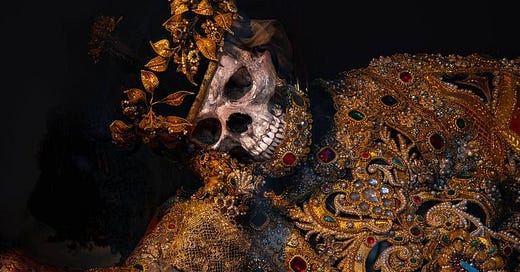And how can man die better
than facing fearful odds,
for the ashes of his fathers,
and the temples of his gods.— Thomas Babington Macaulay, Horatius
Last week a video of a woman explaining why she refused to let her father walk her down the aisle garnered millions of views.
As an independent thinker I’ve decided we’re not going to do every single wedding tradition… It’s the year 2023. Women are not property any more, which is why I decided I will be walking myself down the aisle.
Critical responses centered on her apparent lack of gratitude, her self-centeredness - especially given that her father had offered to pay for the wedding.
But I believe that there is a deeper, largely unidentified reason that her decision attracted such furor: people sensed that this ritual - the father walking the bride down the aisle - is the last stand of a tradition that honors parents as parents. This rite is the only remaining public honoring of The Father.
Understanding the fall of this institution requires confronting the importance of ritual, the imperative of honoring one’s parents, the ancient rites of ancestor worship, and the dissolution of the structures that hold off oikophobia - the hatred of home.
Rituals are important.
The individual that participates in ritual transcends themselves. For a time, they step beyond their individuation into a universal form. They can be referred to not by their name, but by their role in the ritual: the Bride; the Groom; the Father; the Maid of Honor; the Best Man.
The transcendence from individual to archetype results in a deeper and richer potential for communion. In accepting participation in the ritual, one gains access to the full weight of archetypal interaction: the Bride and Groom are no longer in the ill-defined relationship that they have happened into; they are married, with all of the structure and duty and mythology that that entails. Their identities are bound not just to each other, but to everyone that has ever participated in this ritual and assumed these roles.
Attempting to reconfigure the archetypical roles of the ritual inverts these effects. An opportunity for transcendence and communion becomes a reification of narcissism and individuation.
The disappearance of symbols points towards the increasing atomization of society. At the same time, society is becoming increasingly narcissistic. The narcissistic process of internalization develops an aversion to form. Objective forms are avoided in favour of subjective states.
— Byung-Chul Han, The Disappearance of Rituals
Attacking the ritual in this way leads to a sinking deeper into the Self. It makes the event unexceptional: lacking the comfort, depth, and weight of the eternal, it becomes introspective and neurotic. A move from form to formlessness.
In a way, of course, the girl in the video is correct. The form of this ritual - the Father giving away the Daughter - implies a relationship that modern woman rejects. These rituals - unquestioned - have survived far longer than the ideas that underpinned them. But, as the only ancient cultural artifacts left standing, the only remaining frontier for further individuation, they eventually had to fall.
The absence of the honor of the parent in our society is striking. This absence is at the heart of our civilizational collapse. It is no coincidence that the commandment to honor thy father and mother is the first commandment with a promise:
Keep reading with a 7-day free trial
Subscribe to Becoming Noble to keep reading this post and get 7 days of free access to the full post archives.




